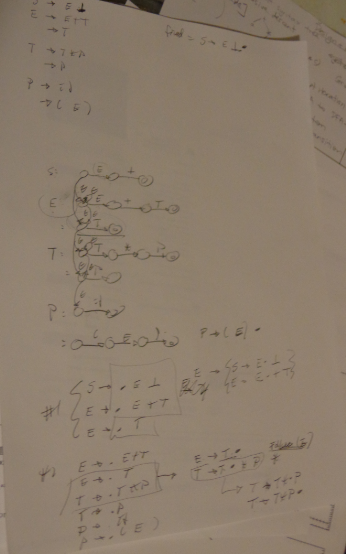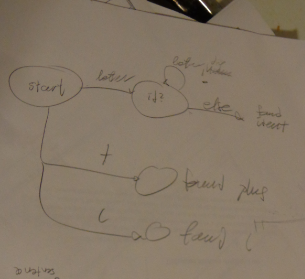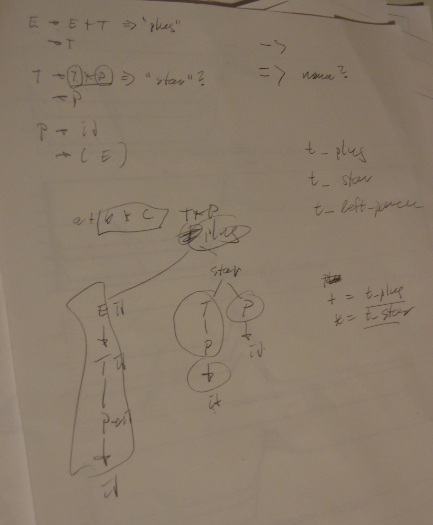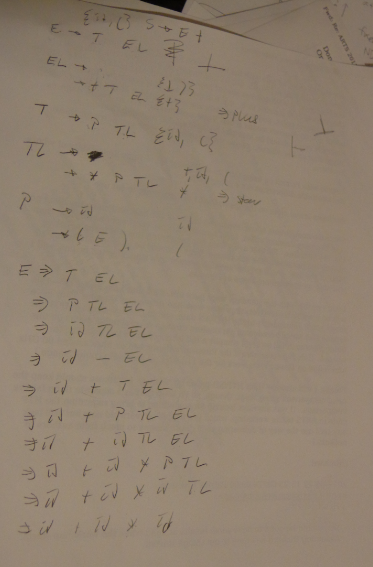Monday September 11th
Notes from Thursday Tutoring Session
- Once a week, my mentor and I sit down and have dinner, and talk about parsers, compilers, and programming language theory.
This was from our first session
-
He’s explaining parsers and recursive descent to me.
-
Also, LL-1 vs LL-0 parsing.




I started thinking about Python
-
One of the things that has fascinated me is trying to understand what a plus sign is to a compiler. What does it mean, and how does it know hierarchy.
-
It makes sense for the hierarchy to represent it as a graph structure. But it’s really quite interesting; concepts like LL-1 and LL-0 parsers, their complexity and efficiency.
Things I learned about
- fixed point iteration (calcuating nullable)
- NDFA to DFA (removing epsilon transitions)
- sentential form (not yet a sentence..like a phrase)
- tokens
- abstract syntax trees
- recursive descent
- LL vs LR parsers
- epsilon vs lambda transitions
- “chickenfoot” (independent of in mathematical notation)
- expression vs expression follows (peek operation)
I found some resources online
-
They Python documentation actually contains Lexical analysis documentation. I didn’t know that until today.
-
This is from a college course. It’s from the University of Utah.
I love this
Few programmers will ever work on a production compiler, but knowing how compilers think is an asset. It makes you a better programmer.
Also a wonderful Paul Graham article
- This stuck out today for me
...I'll call the Python paradox;
if a company chooses to write its
software in a comparatively
esoteric language, they'll be able
to hire better programmers,
because they'll attract only those who cared
enough to learn it....
for programmers...if you want to get a good
job..the language to learn is a language that people
don't learn merely to get a job.
Read the entire article here
- I completely agree with this! It just makes sense to me, and I have to say the smartest, most passionate people I’ve met are people who have learned some interesting language, or built something interesting, or they taught themselves a language because they were really interested and curious and passionate about programming.
I’m still stoked
- I’m excited about the LinkedIn opportunity. I was reading a question on Quora today, where someone answered that life really “unfolds”. That’s very much been the case in my life, and for that, I’m thankful.
For the week
-
Tomorrow, I’m going to a Sailing club. I officially joined a sailing group for women.
-
I also have class on Wednesday, and hang out with my mentor (for a tutoring session) on Thursday evening.
Interesting solution to a kata
- Unnamed user solved a kata to make a letter uppercase by this
char makeupper(char letter) {
return letter & ~('a' ^ 'A');
}
-
This is very interesting! Is it dereferencing the original value, ‘a’, setting it to the new value ‘A’, and referencing the value?
-
update Apparently…
^is an XOR. Ah.
Katas
- An array is inertial if :
- there are odd values
- the max value is even
- every value of odd is more than even values in array
function isInertial(array){
evenarr = []
oddarr = []
var odd = 0 // find out how many odds
var even = Math.max.apply(null, array); // get max value
var greater = 0
// loop through, get odds
for (var i = 0; i < array.length; i++){
if (array[i] % 2 !== 0){
odd = odd + 1
}
if ((array[i] % 2 === 0) && (array[i] !== even)) {
evenarr.push(array[i])
}
if (array[i] % 2 !== 0 ){
oddarr.push(array[i])
}
}
// get min odd value in odds array
var minodd = Math.min.apply(null, oddarr)
// check if every element in even array is less than minodd
function isEvery(i, index, array){
return i < minodd
}
var a = evenarr.every(isEvery)
// if all three satisfied, array is inertial
if ((odd > 0) && (even % 2 === 0) && (a == true)){
return(true)
}
else{
return(false)
}
// for every value of odd, make sure larger than even arr
// output if true for
//1. odd > 0 = true
//2. max value is even = true
// every value of odd is more than even values in arr
return
}
- if any factor of a number is even, return false. If the input is less than 1, also return false.
function isNormal(n){
// tis so cute `^(~_~)^`
var arr = []
// case where n is less than 1
if (n < 1){
return false
}
else{
// loop through to find all even factors
// push to array
for (var i = 2; i < n; i++){
if ((n % i === 0) && (i % 2 !== 0)){
arr.push(i)
}
}
// if array is empty, return true
if (arr.length === 0){
return(true)
}
else{
return(false)
}
return
}
}
Things to be done…
-
Version 1.1 of my C++ programme
-
Data Analysis and finish up Nanodegree
-
And..that’s about it!
